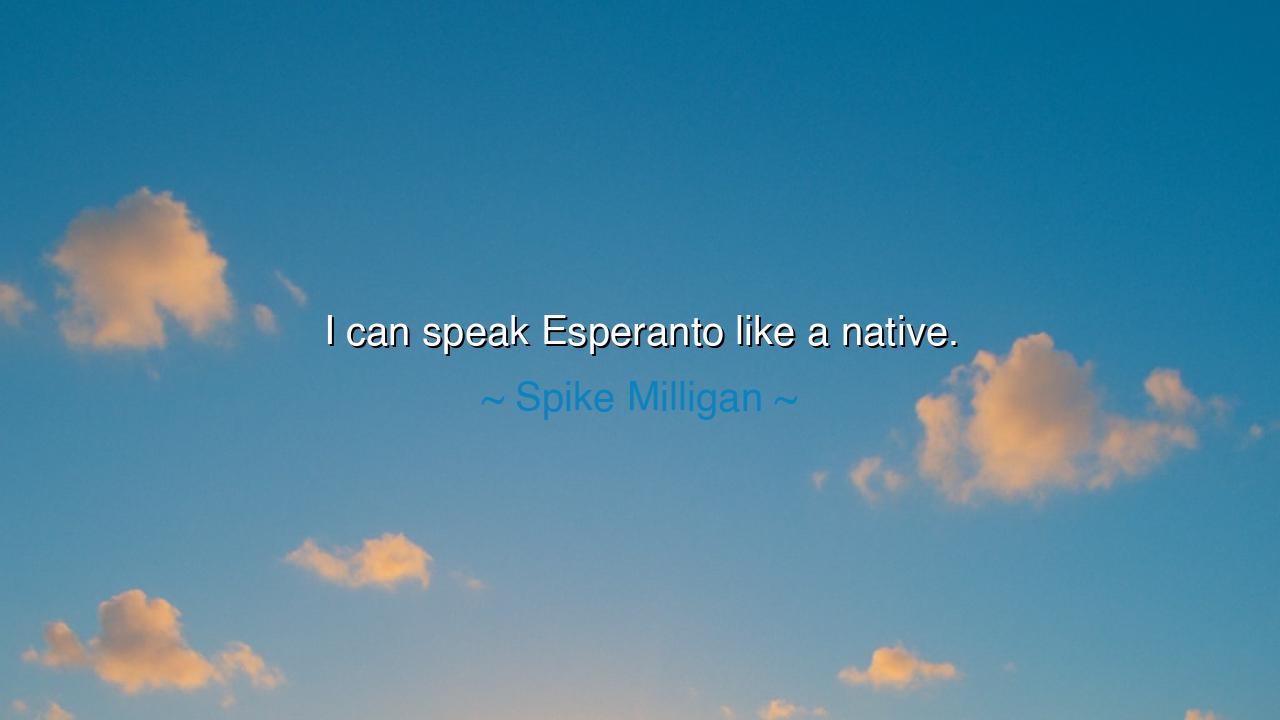
I can speak Esperanto like a native.






In the realm of laughter, where truth and absurdity embrace like lovers, the great jester Spike Milligan once uttered a line that gleams with irony and hidden wisdom: “I can speak Esperanto like a native.” To the casual ear, it is a joke — a playful contradiction, since Esperanto was created as a universal language, a tongue with no homeland, no native speakers. Yet to those who listen deeply, this jest becomes a meditation on belonging, on the illusions of universality, and on the strange beauty of human connection in a divided world. In this single line, Milligan captures both the dream and the impossibility of understanding one another completely.
The origin of this quote lies in Milligan’s genius for transforming absurdity into insight. As a writer, comedian, and poet of surreal vision, he wielded humor like an instrument of philosophy. Esperanto, the artificial language born in the nineteenth century, was meant to bridge nations — to heal the fractures of tongues and tribes. Its creator, L. L. Zamenhof, dreamed of a world where speech itself would unite rather than divide. Yet the dream, though noble, never found the universality it sought. To claim, then, to “speak Esperanto like a native” is to speak perfectly in a language that belongs to everyone and no one. Milligan’s irony holds a mirror to the human condition: we long for unity, but our differences, our cultures, our very individuality, are what make us human.
This contradiction — between the yearning for universality and the truth of diversity — echoes through the ages. The philosopher Heraclitus once said, “The road up and the road down are one and the same.” In this way, Milligan’s joke becomes a parable. For even as Esperanto tried to bring humanity together, it revealed how deeply we cherish our own voices. To speak it “like a native” would be to belong everywhere, yet nowhere — to be all tongues at once, and thus to have none. It is the eternal paradox of the universal man: to love the world so widely that he stands outside every nation.
In another sense, Milligan’s jest speaks to the illusion of expertise — the way humanity convinces itself it can master what, by nature, resists mastery. To “speak Esperanto like a native” is to believe one has perfected the art of communication in a world built upon misunderstanding. How many times have people spoken the same language and yet failed to understand one another? How many wars have been waged not for lack of words, but for lack of empathy? Milligan’s humor thus becomes prophetic: it reminds us that true fluency is not of the tongue, but of the heart. Words alone, no matter how precise, cannot bridge the silence between souls.
History offers us examples of this truth. Consider the Tower of Babel, that ancient tale of ambition, when humanity sought to build a monument that reached the heavens. They spoke one language, and their power was great — but their unity was pride, not compassion, and so their speech was scattered by divine will. From that scattering was born the beauty of many tongues — and the tragedy of division. Milligan’s line, echoing across the centuries, is a playful echo of Babel: man once had one language and lost it; now he has invented a new one to find it again. Yet the loss and longing remain. To “speak Esperanto like a native” is to speak from that longing — to reach for unity while knowing that difference, too, is sacred.
But there is also tenderness in his jest, for it reminds us that laughter itself is the one true universal tongue. Milligan, who saw both the horror of war and the absurdity of peace, knew that humor could cross every border. When he joked about Esperanto, he was not mocking its ideal — he was celebrating it. For laughter, like Esperanto, needs no translation. It is the sound of shared humanity, rising above the clamor of politics and pride. In this sense, when he says he can “speak Esperanto like a native,” perhaps he truly can — for his native tongue was humor, and humor is the language of all who have suffered and yet chosen to smile.
Therefore, O listener, take this teaching to heart. To speak Esperanto like a native is not to master words, but to master understanding. It is to look upon every stranger and see a reflection of yourself. It is to know that communication begins not with the mouth, but with the mind and heart joined in sincerity. Learn languages if you can — but more importantly, learn empathy. Speak to others not to impress, but to connect. For the greatest skill in life is not eloquence, but compassion.
So let Spike Milligan’s jest ring out as both laughter and lesson. “I can speak Esperanto like a native.” It is the laughter of one who has seen through the illusions of division, who knows that unity cannot be built by grammar alone. It is a reminder that though we may never find one language for all mankind, we can still share the one truth that lies beyond words: that to understand, to forgive, and to love — these are the true native tongues of the human soul.






AAdministratorAdministrator
Welcome, honored guests. Please leave a comment, we will respond soon